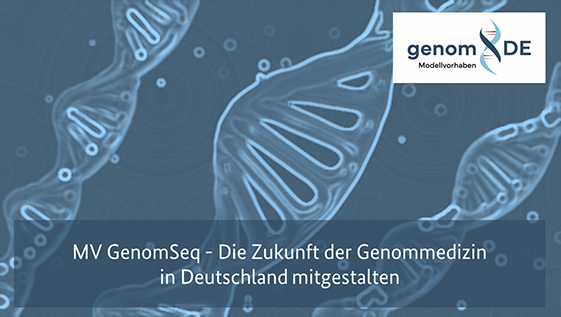Model Project Genome Sequencing
Integrating genome medicine into healthcare - Model Project Genome Sequencing
The model project genome sequencing in accordance with § 64e SGB V and GenDV forms the core of the national strategy for genome medicine of the Federal Ministry of Health in Germany (BMG) .

“Genome medicine” is a branch of medicine that involves the medical application of knowledge about the human genome. Essential to this are technologies such as genome sequencing, which can be used to analyze a person's entire genetic information. This process allows diseases to be diagnosed ever more effectively and therapies and preventive measures to be tailored to individual needs. This is particularly important in the case of cancer and rare diseases. By identifying genetic changes that could potentially cause these diseases, it is possible to make an early and more accurate diagnosis and tailor treatments to the genetic characteristics of the patient. People with rare diseases or advanced cancer are therefore included in the model project. In cooperation with the relevant institutions, the necessary structures and procedures for the important examinations of the patients will be established.
Why does our healthcare system need the model project GenomSeq?
The model project aims to establish and evaluate structures and procedures for uniform, quality-assured, standardized diagnostics and personalized therapy development in accordance with the state of the art in science and technology. The future provision of patient data for both patient care and research is subject to strict controls and meets the highest security standards. The data infrastructure of the model project, which is being set up and operated by the Federal Institute for Drugs and Medical Devices (BfArM) as the platform operator, plays an important role in this endeavour. The pseudonymization processes for data transfer are regulated by the independent trust office at the Robert Koch Institute (RKI) reguliert.
Establishment and evaluation of necessary structures and procedures for genome medicine
Participating clinics collect both clinical and genomic data on their patients that are included in the model project. In addition to the diagnosis and treatment of patients, an additional major aim is to use the data in scientific genomic research, e.g. to uncover new connections between genetic changes and the development of disease, or to personalize therapeutic approaches. The BfArM data infrastructure designed for this purpose is structured in such a way that, after pseudonymization of the data set, the clinical data is stored in ‘clinical data nodes’ and the genomic data in ‘genome data centers’ in a decentralized manner. The processing and provision of data is carried out by ‘data services’. Clinical data nodes, genome data centers and data services are approved and controlled by the platform operator. Clinical and genomic data will be made available for both patient care and research. The access to both qualitatively and technically secure data is provided upon application to the platform operator and is facilitated by data services following a positive decision.
Current status and perspectives
In recent years, the National Strategy for Genome Medicine of the German Federal Ministry of Health (BMG) has ensured that genome medicine has considerably gained in importance in Germany. For the first time, researchers now have the opportunity to access extensive data sets from genome sequencing data and corresponding clinical data. These data provide a valuable basis for the development of new therapies, the personalization of treatment approaches and research on the genetic causes of diseases. As part of the National Strategy for Genomic Medicine, the model project GenomSeq has the overarching goal of establishing genomic medical expertise for improved clinical care in Germany. For this reason, national (e.g. cancer registries) and international (e.g. European genome initiatives) networking and integration of the project will be initiated in the future for improved scientific cooperation. In the long-run, MV GenomSeq will contribute to the routine integration of genomic medicine into healthcare in Germany.
